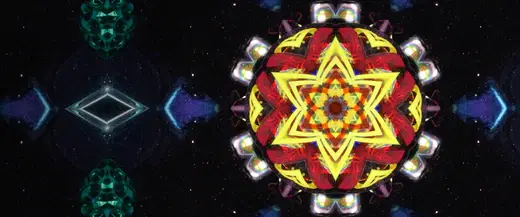The Purpose of the Kaleidoscope and Why We Use It
Dr Joe Dispenza | 15 November 2019
Since my team and I began this journey, we have been extensively training our student body to change their brain waves with their eyes closed in meditation. When you close your eyes in meditation, disconnect from the outer world, and music fills the space, the sensory information coming into the brain is reduced. The less sensory information coming into your brain, the more the neocortex, or the thinking brain, settles down. When the thinking brain shuts down, we move into trance, which allows us to receive more information either from our own autosuggestions, from visions of a new future, or from the quantum field.
Our community has become very adroit at doing this with their eyes closed. In fact, based on the analysis of the research we’ve received from Australia’s Bond University, as well as the research we’ve conducted on our own, the data shows our students have the capacity to quickly and consistently change their brain waves. Many of our students can change their brain waves on command. One of the tools we’ve been using for more than half a decade to help people change their brain waves and move into trance is the kaleidoscope.
In working with the kaleidoscope, we teach people to relax their body and gaze into geometric patterns that unlock the door between the conscious mind and subconscious mind. It’s that doorway where you are most suggestible (suggestibility is your ability to accept, believe, and surrender to information without analyzing it), and it’s that process that changes your brain waves from beta to alpha and theta with your eyes open.
The reason we use the kaleidoscope is because, when you gaze into the kaleidoscope, it bypasses the perceptual networks that are associated with stored “known” information in the brain. You don’t see a car, a bicycle, a face, or anything that you would associate as known to you. Because the neocortex is the memory bank of the known self, it bypasses your connection to everything that is known by association. Now you are opening the door to the unknown.
As you increase your suggestibility by suppressing your analytical mind, the decrease in your brain waves from beta to alpha to even theta, increases your level of trance. So if we teach people how to move into trance with their eyes open, and at the same time we bleed mystical imagery into the kaleidoscope while the person is in a suggestible state, then we are training and programming them for a mystical experience.
When the person closes their eyes after they look at the image overlaid on the kaleidoscope, and I start suggesting things to them while they are remembering the image, it’s highly likely that the person will be right in that realm of low-level alpha or theta. If we can then begin to drop a little seed right in the subconscious, the brain can grab the image, animate it, and turn it into a mystical moment.
We’ve had so much success with people doing this, as well as requests to bring this teaching to those who are not able to attend our workshops, that we decided to do a livestream of the kaleidoscope teaching and meditation from our next Week Long Advanced Retreat in Cancun, Mexico. The livestream will occur on Wednesday, December 4th at 4:30pm EST (1:30pm PST) and will be translated into German, Spanish, Russian, and Italian.
In this session, we will teach people how to use the kaleidoscope, along with activating the pineal gland, to stay in that suggestible state—in the doorway between the conscious mind and subconscious mind. After the kaleidoscope, I’ll teach a breath that will keep you in a state where you’re not quite asleep and not quite awake. That’s the sweet spot where the mystical happens.
To learn more, please visit our events page.

Comments